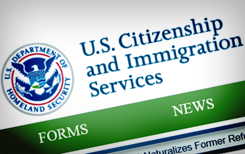Sen. Ron Johnson (R-Wisc.) revealed at a hearing today that on December 3, 2015, the day after the San Bernardino terror attack, USCIS managers obstructed ICE agents from entering the USCIS office building to try to arrest Enrique Marquez, an accomplice in the December 2 plot, and possibly others. Marquez, who supplied some of the weapons used by Syed Farook and Tashfeen Malik in their attack, had been expected at the USCIS building for an interview in connection with his sham green-card-motivated marriage to a Russian woman. The USCIS manager apparently also refused to share the file on "Mr. and Mrs." Marquez with the ICE agents.

As a former visa section manager, I don't have words to describe how perverse this was, nor can I imagine any plausible scenario in which the USCIS manager's actions were excusable. We apparently have reached the point at which USCIS believes that it is more important to protect green card applicants than it is to protect the public by allowing ICE to arrest a terror plot accomplice (who also happened to be engaging in immigration fraud). I guess USCIS has forgotten that it, too, is part of the Department of Homeland Security.
Such stove-piping of information on visa applicants has become deliberate policy in the Obama administration. For example, information in the work permit/deferred action applications of "Dreamers" (DACA) is off-limits to law enforcement as a general matter. The Rubio-Schumer Gang of Eight bill would have enacted the same confidentiality protections for amnesty applicants.
By the way, the title of the hearing was, "The Security of U.S. Visa Programs". The general thrust of the testimony was that U.S. visa programs aren't really all that secure, and immigration laws aren't very well enforced. The State Department's David Donohue, who is in charge of visa programs, had no idea which visas have the most problems with fraud. In another embarrassing appearance, ICE Director Sarah Saldana struggled mightily to explain why an illegal alien who went out drag racing through Omaha streets while drunk, killing 21-year-old Sarah Root, is not considered to be a priority for deportation under current policies. He was released and is now a fugitive. John Roth, the DHS internal watchdog, testified that "archaic" practices at USCIS, together with an overwhelming workload, meant that many ineligible applicants are getting benefits, which presents a major national security risk.
Sen. Johnson expressed dismay at how long it has taken to implement a more robust visa holder tracking system, saying that for companies in the private sector, such as task would be as hard as "falling off a log." In the one bright note of the hearing, Sen. Johnson and ranking member Sen. Carper (D-Del.) agreed to work together on a bill that would require DHS to send foreign temporary visitors a text message reminder before their authorized duration of stay expires, as a way to help deter overstays. This is a good idea to help address a huge problem. According to DHS records, in 2015 there were about 500,000 short-term visitors who overstayed their visas.
